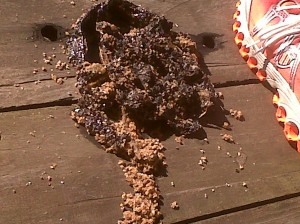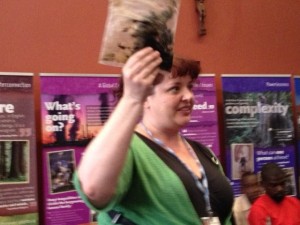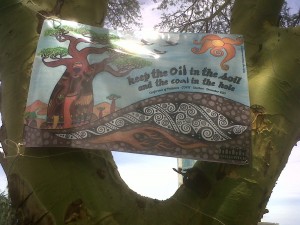By Shannon Biggs
The sun rises at 4:45 each morning in Durban, and like most of those still on California time, I woke soon after. The beach here is beautiful and nearby so I decided to take a brisk walk amongst the shore fisherfolk and shell collectors, a great change the mad bustle of the ICC center, where the official negotiations for the climate conference are taking place.
The bluff beach is several miles south of the harbor—the largest on the African continent—and a few miles north of South Durban, where two oil refineries and dozens of other industrial plants operate. I walked and admired the wild coastline for a mile or so, then sat to watch the waves. Something black and sticky was on my feet, hands and shoes: it was oil. Looking around, I noticed there were large plate-sized piles of black goo…everywhere. Seaweed was coated in it, and as far as the eye could see there were literally tons of large and small deposits everywhere. Some firefighters up on the road were surprised when I showed them the sample I’d collected, and speculated that perhaps it came from a tanker spill in Kenya from last October, but no one knew for sure. Yesterday I’m told that the South African government is denying the “rumors” of oil deposits on the shore (and on my shoes and in my clear plastic bag). There were no big news items or beach warnings posted.
The disturbing and angering irony of a country hosting international climate talks while ignoring (and possibly denying) millions of tons of crude in the very midst of the negotiations is indicative of why international leaders will predictably fail to come to resolution or agreement on how to halt human induced climate change despite the stakes. Instead, they speak of “adaptation” (get used to it) or “risk assessment” (what are we willing to lose next to feed the economic status quo).
Cynical, you say? Not in the least.
Also gathering are pan-African and South African civil society and international climate justice activists—some to Occupy, protest and critique the continuing failure of the UN process itself to reach agreement on greenhouse gas emissions, some hoping to influence negotiators on minor concessions, and many others with reasons of their own. So many of the civil society participants come to talk about climate change in the context of the tangible work they are doing to stop dams, incinerators, deforestation or promote food sovereignty and indigenous rights.
We are here to talk to them—because when we stop putting false hope into the UNFCCC, we can finally turn to each other as the ones we’ve been waiting for. Global Exchange —and our partners including 2011 Human Rights Award Winner Pablo Solon (Bolivia) Fundacion Pachamama (Ecuador) South African activists from South Durban and environmental Earth Rights lawyer Cormac Cullinan, Indigenous Environmental Network, World Futures Council, and many others from the Global Alliance on the Rights of Nature — are here not just to critique the general framework of the UN climate process, but to share and discuss an alternative that requires we the 99% taking action. The week ahead is for us, in this sense, is full of promise.
I brought my non-existent bagged oil along with me throughout the day’s activities. First to the Indigenous People’s Caucus, where Indigenous delegates report on the prior day’s negotiations around forestry, and to several other gatherings in the official and People’s space. Saturday morning we gather for the Peoples’ march.



